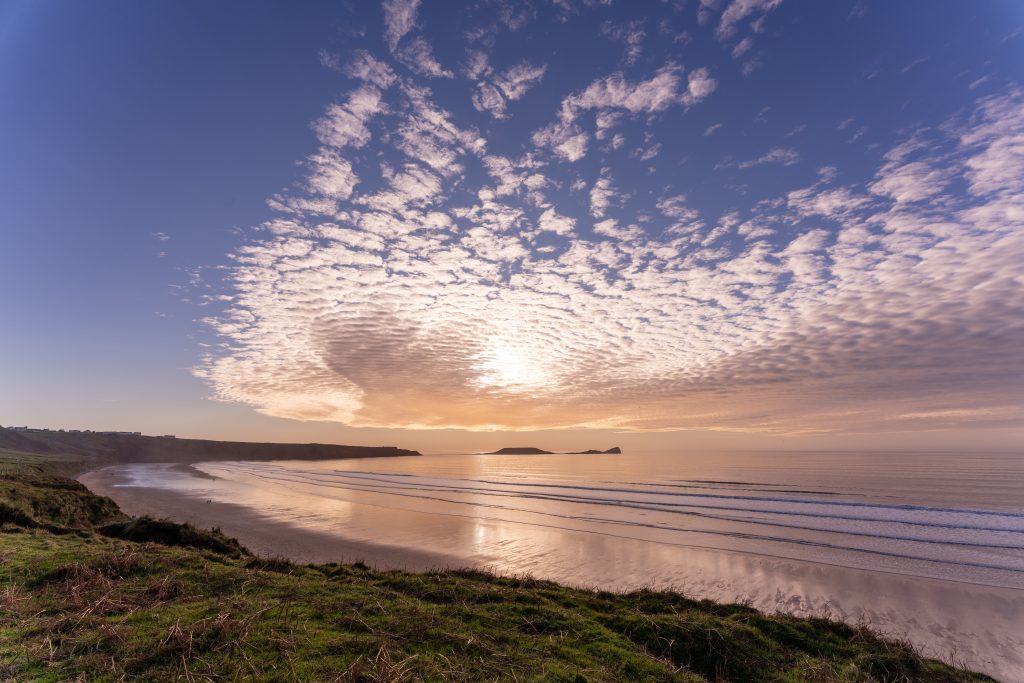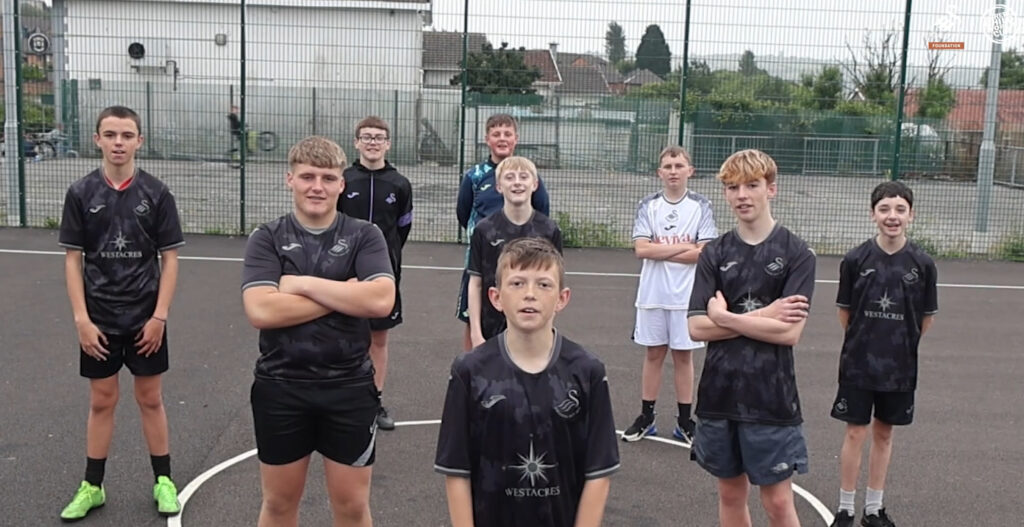Jörg Bernig is a German poet, novelist and essayist. The travel notes presented here were written during a week’s return to his former home of Swansea in 2017.
Here, where I live, the body of the Elbe flowing past also contains the Moldova, and both rivers come from Bohemia, Shakespeare’s ‘desert country near the sea’. Here: the corner of that centre of Europe which meanders from the Baltic down to the Adriatic in a strip of changing width and uncertain borders. Central Europe is characterised by centres and remotenesses, it knows differences as well as similarities, so that a traveller from these parts may move through an otherness, while at the same time remaining within the familiar. This is a somewhat strange dialectic, which has left its mark on the thinking and writing of those who reside here. We are different from one another here, but at the same time we recognise ourselves in the others, without even needing to speak their languages. We recognise each other even when we launch attacks on each other.
Because most of the time this centre of Europe has been a battlefield for something or other, and each of the many peoples living here side by side had, at one time or another, the opportunity to do evil to the others. But it did also happen that one did good to one another, too. Those were, those are the high days of central Europe. Here, I live within hailing distance of three Slavic peoples: the Sorbs, the Czechs, the Poles. My car radio keeps picking up their stations. It’s rather special to drive through Saxon winter darkness and have the chimes of Bohemian church bells relayed to you via the Czech station Český rozhlas Vltava at midnight, followed by the hymn Kde domov můj? (Where is my home?). From this vantage point, Wales is a truly eccentric place, and when I look at the map, I can’t help seeming to hear the sound of Wales—pulled? pushed? by a hidden centrifugal force—tearing itself away from England, in order to drift out into the Atlantic together with Ireland and vanish there in a mystical mist, which only Erik the Red’s Viking ships can pierce.
So I’m off there now, to the edge, to the Multilingual Festival, the celebration of voices at Volcano Theatre in Swansea, where I’m to read poems and a short story from the centre of Europe; off to the edge for one short week and away from this centre here, where things are feeling uncomfortable once again, because a German government in Berlin is creating discord between neighbours. Perhaps it’s hard for an island nation to imagine what it’s like to have neighbours right next to you, meaning: not on the other side of an ocean or a channel but on the other side of the garden fence. It may also be hard to imagine what it means to be at sixes and sevens with others in a confined space, without the option of simply setting sail. In Europe, in the centre of Europe in particular, there’s a dispute over questions of state sovereignty, because in 2015 Germany’s neighbours—unlike Germany – were not prepared to give up their state sovereignty in favour of uncontrolled mass migration, or what is now euphemistically called ‘the globalisation shock of 2015’. It’s hard to believe, but old hegemonic claims directed at Europe are returning in the form of the German government and the so-called opposition parties supporting it.
This time the claims are above all ideological in nature, for, according to one argument, modern societies are defined by ‘multiculturalism’, ‘colour-ful diversity’ and ‘cosmopolitanism’. The official Germany saw itself as a trailblazer for these positions, which the traditional political parties and large sections of the media raised to the status of something like a pan-European doctrine. Critics of mass migration (among them a number of Central Eastern European nations) were not only accused of deviation, but considered unmodern and often designated conservative or outright reactionary. As a consequence, a fundamental transformation of societies in Europe has been triggered by the migration movement, which has lessened since 2015 but continues at a steady pace, and cultural conflicts can no longer be ignored. Germany’s claims, however, do not possess the inescapable appeal of a convincing concept, but rely on nothing more than the notion that it can act like this, simply because it is the economically most powerful country in the European Union, and believes that that entails a political leadership which the others have to follow. There is big trouble in the House of Europe, and a certain shortage of domestic bliss is also making itself felt in the centre of Europe.
So with baggage such as this, off and away, to the edge, to Wales! Perhaps there, looking out to sea, some peace and composure can be found? What was it that Christopher Logue recommended to a friend in search of rural solitude? ‘When all else fails, / Try Wales.’
22 May, Monday
The prevailing (negative) mood in Germany that I leave behind as the plane takes off certainly corresponds to the uniformity which stretches out below; it seems to rumble underneath the luminous view. It’s a beautiful spring day, summer temperatures are being reached, the visibility is excellent, but Europe’s still most densely forested country down below seems to be nothing but one big flowering rapeseed field. Uniform rapeseed yellow coats the country, with all its consequences, because taking a walk through the German May when the rapeseed is in bloom means walking through heavy vapours, means submersion in a fragrance which soon reveals itself to be a stench that will only recede when you’re back home and under the shower. German agriculture has turned itself into an energy industry. Rapeseed oil is mainly used as biofuel, only to a very small extent as a foodstuff. Meanwhile the big German car manufacturers are cheating on exhaust emission values for their vehicles. Political one-upmanship and economic fraud… This is what it looks like when you gaze down from the plane, everything covered by a sulphur-yellow and only apparently friendly blanket of rapeseed.
Even from a height of ten thousand metres it’s easy to make out when the border to the Netherlands is being crossed. Suddenly everything’s green down there, there’s a different order, a structure: the cultivated landscape is the signature of the Dutch. The masterpiece of land wrested from the sea… Bravo, cousins!
Flying over the English Channel from Amsterdam in the direction of Cardiff, enormous offshore windfarms come into view, which, however, viewed from above, look like military cemeteries on the western front. The wind turbines, like white crosses, stick up out of a brownish ground; the sea is a ploughed field and the ships are the visitors at the great military cemetery. They shuffle away, dragging their feet, scratching the surface of the brown sea and drawing small white lines. Our European history of murderousness still intrudes upon the interpretation of this image; seeing the masts of the wind turbines, one cannot see the kind of white sticks to which, say, roses could be fixed. Does our history spoil the view? Even if we ourselves were not involved in the past present?
After that it doesn’t take long and the Thames is meandering under the plane. Visibility is good over England too, and already the outskirts of London are moving towards us, soon bridges can be discerned, and there, quite clearly, Tower Bridge and over there the London Eye, and there Westminster! The plane moves quietly westward over the city towards Wales, where I’m looking forward to being because I used to live there years ago. So this is a return, perhaps even a homecoming, for the friend I’m staying with wrote that he wouldn’t be getting back until later this week but of course I knew where to find the house key, didn’t I?, and I’m happy… As Heathrow airport drifts into view below, a young Arab sitting in front of me is exchanging wordless glances and gestures with one of his two fellow passengers.
For the whole duration of the flight he had silently looked out of the window, but now he takes his mobile phone from his jacket pocket and films and photographs London Heathrow airport below, until, despite the contortions of the photographer, it’s no longer visible outside the cabin window. My fellow passenger puts his mobile back in his jacket pocket. Ping! the little bubble of travel illusion bursts. And the little wish to escape the onslaught of contemporary everyday life with this short journey to Wales must already capitulate to a reality that subjects everything to a new interpretation—and be this interpretation the result of caution? even of suspicion? Ping!
But at least the English and, as landing approaches, Welsh fields do not unfurl in that uniform German rapeseed yellow, but are green, like the Dutch ones. Ah, hedge-fringed green! Ah, over to the left and far ahead, the sea; ahead, Wales! As the plane dips down gently into this green, the Severn windingly approaches, the funnel of the Bristol Channel opens up. To the north of it lies Wales, to the south Devon. Diving into this green, submerging. Traveller’s pipe dream. Travelling and wishing, wishing and travelling: one and the same. Cardiff airport lies ahead, and the young Arab in front of me, who had paid no attention to the fields, the scenery, below, once again wordlessly exchanges glances and gestures with his fellow passenger, once again takes his mobile phone out of his pocket and films the landing, films the airport buildings and terrain as it quickly moves into view; he keeps filming until the plane swivels round into its parking position. Some are interested in trains, others in ships, others in airports, so what? Does our history spoil the view? Even if we ourselves were not involved in the past present? Does the present also spoil the view? Even if we ourselves are not involved in the present present, but just want to pursue our goals? Is the din of the present leading us straight into paranoia? Why can’t it be fended off, the present? Hey, Captain Kirk, why aren’t the deflector shields working?!
At the baggage carousel, the artificial community of the plane dissolves, everyone takes their suitcase and goes out to set foot on Welsh soil. The early summer warmth of the mainland has yet to reach Wales; a stiff breeze is blowing. A sign at the airport building announces: Croeso i Gaerdydd.
In the middle of the afternoon traffic jam the bus inches forward towards Cardiff Central Station. Hesitatingly it conquers a bit of road—which is already lined with signs for the European Champions’ final, and of course it’s Real Madrid who’s playing, this time against Juventus—the bus stops again, then it flies along freely, only to hit the pack of traffic again. It’s a race in which attempts at escape are pointless, as the result is clear from the outset: everyone will arrive at the same time. That’s good, because it makes for a slow convergence after the swift skip of an hour from mainland to island, when entire countries and cities like Amsterdam or London drift away beneath the plane. A bit of a stroll to let the soul catch up.
At Cardiff Central, platform four is overcrowded. Opposite on platform three, a poster can be made out—Richard Strauss, Der Rosenkavalier. Announcements in English and Welsh echo over the heads of those who wait. The Great Western Railway train arrives, everyone takes a seat and we’re off into the countryside via Neath and Bridgend to Swansea. An acquaintance of my Swansea friend once overheard a conversation on the bus from Pontardawe to Swansea (supposedly around 2004), in which someone made a joke about Swansea as ‘Bangladesh”, which the other person, however, didn’t immediately understand. Until then, migration was primarily from Asia, but the current ethnic cityscape is so diverse that the joke would no longer make any sense.
Ethnic groups in Swansea today come from all corners of the Earth. In the county town of the German region where I live, people have begun calling the road that connects the welfare office with the mass accommodation centre housing the migrants who arrived during the last couple of years, Ramadan Road. And on the edge of the small town where I grew up there was a street of bungalow-style houses, built after the war: that was New Delhi. A small settlement outside the city surrounded by fields was called New Russia. And it seemed obvious to everyone that the remote houses of a nearby village couldn’t be called anything other than Korea. References to geography used to reflect social remoteness; those ‘out there’ were also often socially marginalised. Little has changed in this respect. You end up dragging stuff like that around with you in your invisible luggage, without remembering ever having packed it. It only takes one word and out it jumps from the dark corners of discarded junk and joins in interpreting the world.
Syniadau uchelgeisiol, awdurdodol a mentrus.
Ymunwch â ni i gyfrannu at wneud Cymru gwell.
Outside Swansea’s train station, the forecourt no longer resembles the one which welcomes readers in my novel Weder Ebbe noch Flut, but the homeless and the junkies still hang out there as ever, while, as ever, the Union Jack and the white-green flag with the red Welsh dragon flutter on the Grand Hotel opposite. Look closely, take note, remember this when, one day, all this may no longer exist, when Wales will have been swept out into the mystic mist of the Atlantic!
The key to the house of my friend, who is still away travelling somewhere, is, as promised, in the familiar place. With one small motion of the hand, a dis-estrangement. The walk to the Brunswick Arms feels exactly like the walk to the office for re-acquiring citizenship. Comfortable at a corner table, legs stretched out, talking to another friend, one who isn’t travelling. As if I’d never been away. The cup of sentimentality is spooned up in leisurely scoops, like delicious ice cream. What’s twenty-five years! Before my mind’s eye the green fields of England and Wales are still passing by, while the plane is slowly descending to Cardiff. So, a successful escape from the present after all? From history? For moments, the centre of Europe is where it belongs: far away in the centre of Europe. For once, I can’t hear voices from over there. Indeed, the world is where one likes to have it: not too close. Ah, the edge! Wales. The sounds of the sea seem to travel up from Swansea Bay straight into the Brunswick Arms. Admittedly, that’s not possible, but hey, just go with it. The Brunswick itself is a Mare Tranquillitatis.
That night at half past eleven I hear the BBC report that there has been a bomb attack in Manchester. At a pop concert.
23 May, Tuesday
Once again waking up into a morning filled with bad news. The radio news now reports how many were killed in the attack. The BBC states that the concert had mainly been attended by teenagers and children. Some parents had been waiting outside the concert venue to pick up their children and take them home. One of the girls killed was eight years old. The children were not ‘collateral damage’, as official announcements occasionally phrase it when civilians are among those who lose their lives during military operations. The children were the target, and it wasn’t a military operation, it was vile murder, under-hand, utterly cowardly. The murderer, the ‘suicide bomber’ as they say—but isn’t that a technical term which elevates murder into some kind of professional discipline and thus lends importance to the killer?—was a 22-year-old young man, the Manchester-born son of a family who had fled from Gaddafi’s Libya to England. However, the News at Ten on TV that evening reported that the murderer’s parents and siblings were now living in Libya again. The murderer had returned from there to Manchester just a few days earlier.
Down below in Swansea Bay, at low tide the sea retreats far into the Bristol Channel. Then the tide comes in. A calm, uninterrupted breathing. It isn’t true that the world holds its breath when something happens. The world breathes and breathes and breathes. Only we humans are sometimes winded, terrified we raise our hands to our mouths, open our eyes wide, bury our faces in our hands. Until word comes—from where? who says it?: Come now, let’s go on. But outside Swansea train station, police now patrol with machine guns.
BELONGING TO WALES / PERTHYN I GYMRU is a series featuring extraordinary stories from ordinary people across Wales and beyond.
The first four contributions are taken from an e-book of multilingual stories about arriving in Wales by Meltem Arikan (Turkish), Marie Darrieussecq (French), Edin Suljic (ex-Yugoslavian, English), and Jörg Bernig (German) – with English and Welsh translations. These texts were commissioned by Dr Kathryn Jones of Swansea University’s Department of Modern Languages, for the AHRC-funded research project ‘European Travellers to Wales 1750-2010’ at Bangor University. Reader responses to these stories are welcome. Email [email protected]
We are also actively seeking submissions to the series. Email [email protected]





